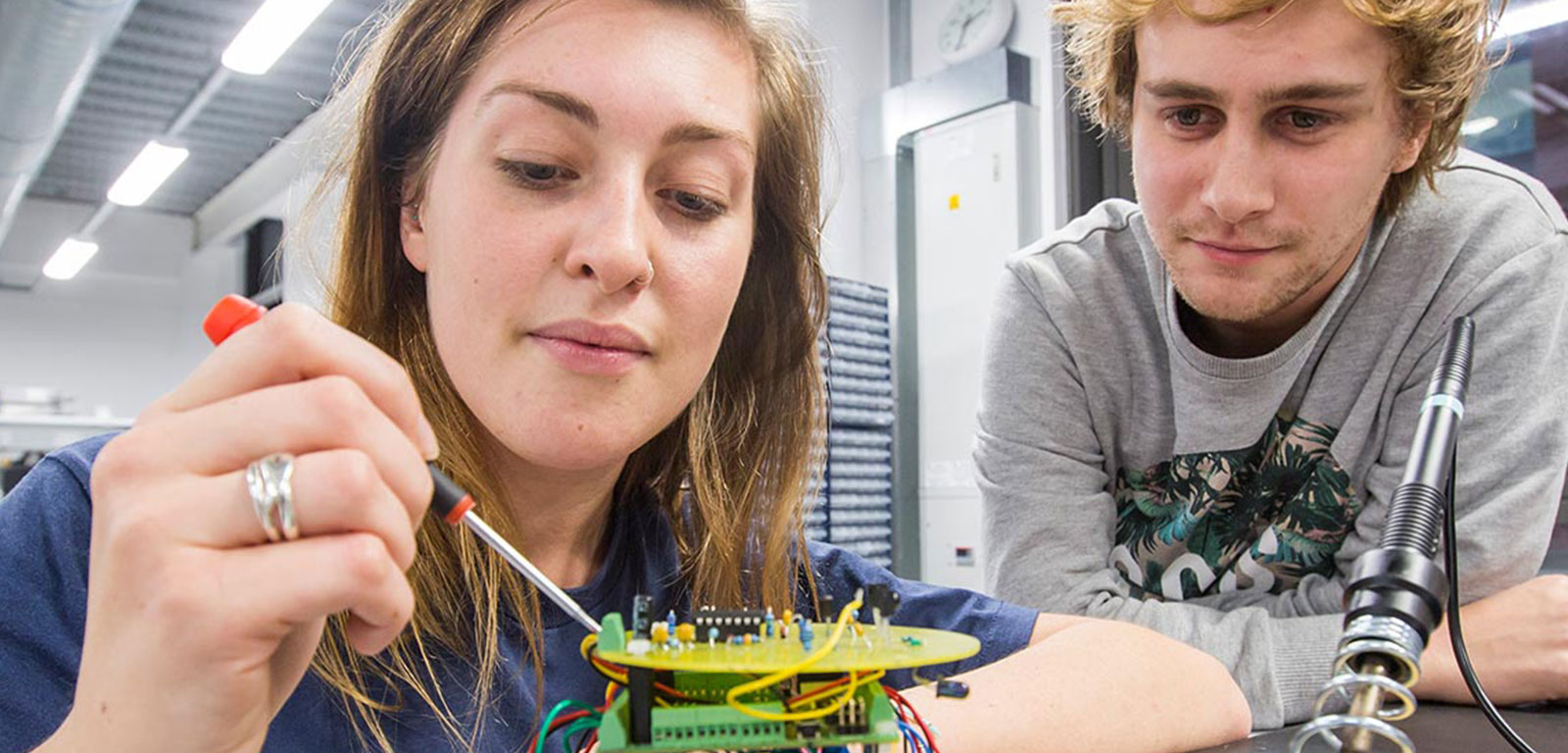

We accept the following English language qualifications at the grades specified*:
IELTS Academic module overall 6.5 with 5.5 in each component.
TOEFL-iBT (including Special Home Edition) 92 or above with 20 in each section. We do not accept TOEFL MyBest Score to meet our English language requirements.
Cambridge English: Advanced or Proficiency overall 176 with 162 in each component.
Trinity ISE: ISE II with a distinction in all four components.
We also accept a wider range of international qualifications and tests.
English language qualifications must be no more than three and a half years old from the start date of the degree you are applying to study, unless you are using IELTS, TOEFL, or Trinity ISE, in which case it must be no more than two years old.
From the tiny processors found in smartphones to the heavy duty power electronics in wind turbines, electronic and electrical systems underpin many modern technologies.
Electronics and engineering graduates are spearheading advances in areas including, but not limited to:
As well as more sophisticated technologies for connecting generating capacity to the grid.
Studying this field requires a clear understanding of both the physics and the broader system it operates in, alongside teamwork and the determination to find ingenious solutions.
Ties to industry
Our Industrial Liaison Board includes senior representatives from important electronics and electrical engineering companies and has influenced curriculum and programme development.
Accreditation
This programme is accredited as fully satisfying the educational base for a Chartered Engineer (CEng).
More info: Click here
Year 1
Engineers are creative problem solvers, adept at working in professional, interdisciplinary teams to tackle society’s ever-more complex challenges.
In Engineering Principles you will experience a wide range of such challenges, developing essential engineering skills and gaining an understanding of the subject’s breadth and the role your chosen discipline plays.
In Engineering Design you will work as part of a team on an interdisciplinary engineering task – getting involved in design, and using your engineering judgement to evaluate your solution to a task.
These introductory courses will help you to develop the confidence, advanced thinking, team-working and problem-solving skills that you will later rely on as a professional engineer.
You will also study mathematical topics with particular relevance to engineers. In addition, you will choose courses from across the University to complement your engineering studies, with options available in sciences, arts and humanities*.
*(Revised 3 June 2020 to update Year 1 information.)
Year 2
In Year 2 you will specialise in core electrical engineering topics including analogue circuits, digital system design, and software and embedded systems laboratory.
These courses prepare you for further specialisation at honours level, covering technical concepts and where possible, giving you the opportunity to apply these in a practical situation.
You will study programming to develop your skills in computer control and simulation – essentials in the engineer’s toolkit.
Those studying Electronics and Computer Science will be introduced to computer systems and algorithms and data structures. Those studying Electrical and Mechanical Engineering will study structural mechanics, fluid dynamics and thermodynamics. Engineering mathematics is also studied.
You will continue your professional development with a course on essential professional skills for engineers*.
*(Revised 3 June 2020 to update Year 2 information.)
Year 3
The thematic areas developed are continued into Year 3. You will also learn about electromagnetics and control engineering.
There are project laboratories in digital systems design, analogue mixed signal design and embedded software. There is also a laboratory in electrical machines and another in control engineering.
You will learn about the economic and technical aspects of supplying power in the Power System Design Group Project.
Year 4
You will select courses in topics you are interested in.
Courses in bioelectronics are also available. At least one-third of the year is practical, with some of the option courses providing additional practical experience.
The highly motivational Group Design Project is multidisciplinary, and you will be working with peers from other engineering disciplines to complete a design and report that mimics the way practising engineers work together in teams.
You will also begin your major project that will span Years 4 and 5. If you are undertaking an industry-sponsored project on placement, it will normally be conducted on the company premises. If you undertake an internal project, you will work in the University.
Year 5
You will continue to select courses in topics you are interested in.
Many of the courses are dominated by practical project work. These courses are taken after the completion of the project. This phase of the project represents half of the year’s work, making Year 5 dominated by the application of learned knowledge to practical situations.
Programme structure
Find out more about the compulsory and optional courses in this degree programme.
To give you an idea of what you will study on this programme, we publish the latest available information. However, please note this may not be for your year of entry, but for a different academic year.

Both electronics and electrical engineering are vibrant and expanding parts of the UK economy where demand for graduates exceeds supply.
There are many opportunities for well-qualified and creative graduates to enjoy stimulating and rewarding careers.
